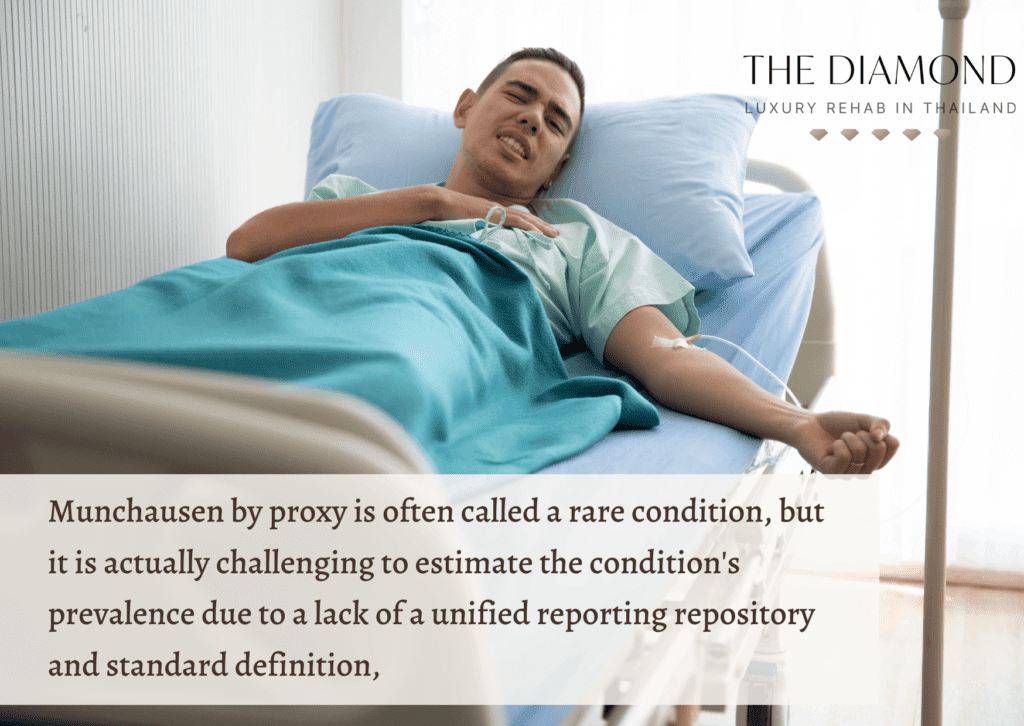Munchausen by proxy: definition, causes, symptoms, and treatment
Table of content
- What is Munchausen by proxy?
- What are the causes of Munchausen by proxy?
- What are the symptoms of Munchausen by proxy?
- Who is affected by Munchausen by proxy?
- What are the risk factors for Munchausen by proxy?
- How is Munchausen by proxy diagnosed?
- What are the treatments for Munchausen by proxy?
- How to prevent Munchausen by proxy?
- What to expect with Munchausen by proxy?
- What is the difference between Munchausen by proxy and Munchausen syndrome?

Munchausen by proxy is a psychological disorder in which a caregiver, often a parent, intentionally causes or fabricates physical or psychological symptoms in someone under their care. This can be a child, elderly individual, or even a pet.
The causes of Munchausen by proxy include past trauma, seeking sympathy, seeking control and power, external incentives, and underlying mental disorders.
The symptoms of Munchausen syndrome by proxy include fabricating or inducing symptoms in a child, mismatch between perceived symptoms and test results, medically unexplained symptoms, manifestation of symptoms when the caregiver is present, extensive history of medical tests and procedures, and refusal to leave the child’s side.
The treatment options for Munchausen by proxy involve both treatments for the child and the caregiver.
What is Munchausen by proxy?
Munchausen by proxy is a complex and harmful psychological condition that revolves around a caregiver’s manipulation of a vulnerable individual’s health for personal gain. In this disconcerting disorder, the caregiver orchestrates a facade of severe illness or injury in the person under their care, often with elaborate fabrications and exaggerated symptoms.
This disorder shows up as a disturbing mix of lying, manipulating, and a constant drive to keep up the appearance of serious illness. As a result, the victim is frequently made to undergo unneeded tests, surgeries, and therapies.
Because of the potential for severe physical and psychological injury as a result of the perpetrator’s conduct, Munchausen by proxy is a serious and complex problem that calls for expert intervention to protect the victim’s wellbeing.
What is Munchausen by proxy called now?
Munchausen by proxy is now called factitious disorder imposed on another (FDIA). The transition from Munchausen syndrome by proxy to factitious disorder imposed on another describes a person’s behavior more accurately, according to an article on factitious disorder imposed on another (FDIA) from the Cleveland Clinic.
On the other hand, an article titled, “Fabricated or induced illness in a child” published in the November 2019 issue of the British Journal of Nursing states that the phrase fabricated or induced illness in a child by a carer (FII) is preferred in today’s literature, especially in the United Kingdom.
When was Munchausen by proxy renamed?
Munchausen by proxy was renamed in 2013 as factitious disorder imposed on another (FDIA) during the publication of the fifth edition of the Diagnostic and Statistical Manual of Mental Disorders (DSM-5).
The goal of this term change was to emphasize the factitious nature of the disorder—where a caregiver pretends that someone they care for is ill—while also offering a more precise, targeted, and less stigmatizing definition of the condition.
Is Munchausen by proxy a mental illness?

Yes, Munchausen by proxy is a mental illness. It is recognized as a diagnosable psychological condition in the DSM-5, which is a psychiatry text published by the American Psychiatric Association (APA) and is an essential resource for mental health professionals worldwide.
The diagnosis of factitious disorder imposed on another encompasses the condition that was previously referred to as Munchausen syndrome by proxy (MSBP). It’s worth noting that, even though the medical community now uses the term factitious disorder imposed on another, the general public still refers to it as Munchausen syndrome by proxy, according to a 2020 article written by Marc D. Feldman, MD for Medscape.
Is Munchausen by proxy a form of narcissism?
No, Munchausen by proxy is not exactly a form of narcissism. However, Munchausen by proxy is related to narcissism. While they are distinct psychological conditions, they share overlapping behaviors and traits.
Those suffering from Munchausen by proxy may also have psychiatric comorbidities such as narcissistic personality disorder, according to a 2020 article on factitious disorder imposed on another (Munchausen by proxy) from Medscape.
The connection lies in the shared desire for attention and validation, but the ways in which they manifest and the individuals they affect differ, with Munchausen by proxy being directed towards the victim under the caregiver’s care, and narcissism primarily being self-centered.
Munchausen by proxy is characterized by a caregiver fabricating or causing illness in someone under their care to gain attention, sympathy, or a sense of importance. Narcissism, on the other hand, is a personality disorder characterized by an excessive preoccupation with one’s self, a lack of empathy for others, and an inflated sense of self-importance.
Is Munchausen by proxy a crime?
Yes, Munchausen by proxy can be considered a crime because it is a form of child abuse. In fact, a 2017 case report on a serial Munchausen syndrome by proxy published in the Indian Journal of Psychological Medicine states that there is a substantial likelihood of reoccurrence with this sort of child abuse, and delaying a diagnosis could be fatal for the child.
Abuse occurs when someone else, usually a kid or dependent adult, is purposefully made sick or induces illness in them. Physical and emotional harm can arise from medical professionals performing unneeded surgeries, prescribing inappropriate drugs, or otherwise overtreating a patient.
Furthermore, a 2018 article written by Michael C. Weber for the Law Enforcement Bulletin of the Federal Bureau of Investigation states that this kind of crime was brought to the attention of the Criminal District Attorney’s Office (TCCDAO) in Tarrant County, Texas, in January 2009.
Since then, the agency has looked into sixteen claims of medical child abuse and has provided three more reports to the Fort Worth Police Department for investigation. Seven prosecutions (five felonies, one misdemeanor, and one case awaiting trial) and one ongoing investigation have resulted from these inquiries.
How common is Munchausen by proxy?

Munchausen by proxy is often called a rare condition, but it is actually challenging to estimate the condition’s prevalence due to a lack of a unified reporting repository and standard definition, according to an article written by Laura Criddle for the December 2010 issue of Critical Care Nurse.
The same paper, however, states that according to expert estimations, the prevalence of Munchausen syndrome by proxy (MSbP) is between 1 in a million and 2.8 in 100,000 children. There are also a number of descriptive studies that have been conducted to determine how common MSbP is in specific demographics.
For instance, over a 32-year period, a 2007 case report by Feldman et al., published in Pediatric Nephrology analyzed hospital data and found 135 cases of MSbP diagnosed at Seattle Children’s Hospital.
Additionally, according to a 1996 study by McClure et al., published in the Archives of Disease in Childhood, in the United Kingdom, the prevalence of Munchausen by proxy is 0.5 per 100,000 children aged below 16 years.
On the other hand, a 2022 article medically reviewed by Smitha Bhandari, MD for WebMD states that due to the fact that many cases of Munchausen syndrome by proxy (MSP) go unrecognized, accurate figures on the number of people in the United States who have the illness are unavailable.
What are the causes of Munchausen by proxy?
The causes of Munchausen by proxy involve the factors and events that lead to the emergence of the disorder. The most common causes of Munchausen by proxy are listed below.
- Past trauma
- Seeking sympathy
- Seeking control and power
- External incentives
- Underlying mental disorders
1. Past trauma
Past trauma refers to distressing or harmful events that an individual has experienced in their life, often during their formative years or at any point in the past. Traumatic experiences can encompass a wide range of events, such as physical or emotional abuse, neglect, accidents, witnessing violence, or being a victim of violence, among others.
There are a number of ways by which unresolved trauma might play a role in the emergence of Munchausen by proxy. Those who have been traumatized may respond to their distress with unhealthy coping techniques.
They may have trouble regulating their feelings and communicating effectively with others. As a fundamental feature of Munchausen by proxy, the act of producing or faking illness in another person may be used by those who have internalized emotions of powerlessness or worthlessness as a means to reclaim a sense of control or self-worth.
In other cases, trauma from the past can also make it hard for someone to understand and recognize the pain they are causing to others.
2. Seeking sympathy

Seeking sympathy refers to an individual’s desire to gain emotional support, compassion, and attention from others, often in response to a perceived hardship or difficulty in their life.
People may seek sympathy when they are going through challenging situations, facing illness, or experiencing emotional distress. In the context of Munchausen by proxy, the act of seeking sympathy is a crucial motivation that contributes to the development and continuation of this harmful behavior.
Individuals who engage in Munchausen by proxy typically have a deep-seated need for attention and validation. They may feel a void or a lack of recognition in their own lives, and they seek to fill this void by creating a situation where they appear to be devoted and caring caregivers. By orchestrating or fabricating illnesses in someone under their care, they elicit sympathy and attention from their social and medical circles.
3. Seeking control and power
The desire to have influence, dominance, or authority over individuals and their surroundings is referred to as seeking control and power. This drive for control can present itself in a variety of situations, ranging from personal relationships to professional settings.
The process of inducing or creating an illness helps the caregiver to establish themselves as the central figure in the victim’s care, making key medical and emotional decisions on their behalf. This control provides a sense of power and dominance that they may not experience in other areas of their life. It can be a way for them to compensate for feelings of insecurity or powerlessness.
4. External incentives
External incentives in the context of Munchausen by proxy refer to external factors or motivations that prompt individuals to engage in this harmful behavior. These incentives can take the form of social approval, validation, and support that caregivers receive from their community, friends, or healthcare professionals when they appear to be diligently caring for a supposedly ill individual.
The positive reinforcement and recognition that come with being seen as a devoted caregiver can serve as a strong driving force for those involved in Munchausen by proxy. This external validation may fulfill their need for a sense of self-worth and significance, making it a potent motivator that contributes to their manipulation and deception.
5. Underlying mental disorders

Underlying mental disorders are conditions or disruptions in an individual’s mental or emotional health that are not readily apparent. Mental disorders that may cause Munchausen by proxy include personality disorders and an anxiety disorder.
According to an article titled, “Causes – Fabricated or induced illness” from the National Health Service, individuals suffering from personality disorders derive satisfaction from actions or circumstances that would cause great anguish to others.
It’s believed that some caregivers or parents who participate in fabricated or induced illness find it fulfilling to see their child receiving medical attention. Additionally, some parents suffer from anxiety disorders that cause them to worry unnecessarily about the health of their children.
Some parents worry about their own health as well. Even though they may have sincere concerns for the child, their actions may nevertheless be harmful to the kid because of their unfounded concerns.
What are the symptoms of Munchausen by proxy?
Symptoms of Munchausen by proxy refer to the outwardly apparent manifestations of an abusive caregiver’s actions. The most common symptoms of Munchausen by proxy are listed below.
- Fabricating or inducing symptoms in a child
- Symptoms don’t match test results
- Symptoms don’t fit any disease
- Symptoms appear in the caregiver’s presence only
- Extensive history of medical tests and procedures
- Refusal to leave the child’s side
1. Fabricating or inducing symptoms in a child
Fabricating or inducing symptoms in a child refers to the deliberate act of a caregiver, often a parent or guardian, causing a child to appear or genuinely experience physical or psychological symptoms that are not naturally occurring.
Caregivers who carry out Munchausen by proxy may purposefully generate or exaggerate symptoms in the kid they are caring for, frequently in order to earn attention, sympathy, or a sense of importance.
They might falsify medical conditions or provoke real symptoms through various means, including administering medications, toxins, or other harmful actions. This symptom is a central characteristic of FDIA and is often a cause for concern as it places the child at risk, both physically and emotionally, and highlights the caregiver’s underlying need for external validation and control.
2. Symptoms don’t match test results

When a person’s symptoms do not correspond with their test results, it indicates that there is a considerable discrepancy between the caregiver’s reported or observed symptoms and objective medical test, examination, or diagnostic results.
Perpetrators often exaggerate or fabricate the severity of the symptoms experienced by the individual they are caring for. They may describe the person as seriously ill or experiencing specific health issues that do not align with the results of medical tests, which consistently fail to confirm the expected severity or type of illness.
This discrepancy is a fundamental indicator of Munchausen by proxy because it signals that the caregiver is manipulating or feigning symptoms. The observed inconsistency becomes a significant red flag for healthcare professionals, raising suspicions and leading to further investigation.
3. Symptoms don’t fit any disease
When an individual’s symptoms do not fit any disease, it describes a circumstance in which the symptoms that the individual receiving care has reported or seen do not match up with any recognized illness or medical condition.
In cases of Munchausen by proxy, the caregiver deliberately makes up symptoms in the victim, and these symptoms often appear puzzling and inconsistent to medical professionals. Despite extensive evaluations, tests, and diagnostic procedures, healthcare providers cannot identify a legitimate underlying medical cause for the reported symptoms.
This symptom is a clear indication of Munchausen by proxy because it suggests that the caregiver is deliberately manufacturing or exaggerating symptoms that have no medical basis. The incongruity between the reported symptoms and any recognized disease underscores the manipulation at play.
This practice puts the victim in jeopardy and exposes the caregiver’s true objectives, which typically involve seeking attention, sympathy, or a sense of importance by posing as a dedicated caretaker to someone with strange, unexplained health difficulties.
4. Symptoms appear in the caregiver’s presence only
Symptoms appearing in a caregiver’s presence only refers to situations where the described symptoms in the person being cared for by the caregiver only show up when the caregiver is there.
This is a distinctive and suspicious pattern because it implies that the caregiver may be directly causing or exaggerating the symptoms. The symptoms often seem to “disappear” or significantly improve when the caregiver is not around, which raises significant concerns.
5. Extensive history of medical tests and procedures

An extensive history of medical tests and procedures means that the person being cared for has had numerous medical exams, tests, and treatments. These can involve blood tests, scans, surgeries, and other medical procedures, even when they might not be necessary based on the person’s actual health needs.
The caregiver’s constant assertions of illness and demand for validation and attention from healthcare professionals can be interpreted as the cause of the vast history of medical tests and procedures.
The needless nature and frequency of these tests and procedures may cause concerns among healthcare providers, who may begin to doubt the reality of the claimed symptoms. It also puts the person in the caregiver’s care at danger, because frequent medical interventions can have physical and emotional implications.
6. Refusal to leave the child’s side
Refusal to leave the child’s side refers to a caregiver’s intense and unyielding attachment to the kid in their care. This connection shows itself in the form of an obsessive need to be at the child’s side at all times, but especially during visits to the doctor, stays in the hospital, or other forms of medical care.
By refusing to leave the child’s side, the caregiver can closely supervise the interactions of medical personnel with the child and guarantee that the reported symptoms and invented medical history are presented consistently. This activity is frequently motivated by a desire to influence the medical narrative and retain the appearance of a dedicated caregiver.
Who is affected by Munchausen by proxy?
Munchausen by proxy primarily affects moms of little children, adult children caring for an aging parent, and those who have an extensive knowledge of medicine and work in the medical field, according to a 2021 article on Munchausen syndrome by proxy written by Neil K. Kaneshiro for MedlinePlus.
However, a 2022 article titled, “The Facts About Munchausen by Proxy Syndrome” from Newport Academy states that fathers might also be affected by the condition. Munchausen by proxy is therefore categorized as a form of child abuse. As a matter of fact, medical professionals call it “medical child abuse.”
What are the risk factors for Munchausen by proxy?
Risk factors for Munchausen by proxy describe particular components, characteristics, or situations that heighten the probability of an individual participating in this detrimental conduct. The risk factors for Munchausen by proxy are listed below.
- Childhood trauma or abuse: Individuals who have experienced past trauma or abuse in childhood may be at greater risk for developing the condition. Their unresolved emotional distress and coping mechanisms can contribute to the desire for external validation and control, which are often underlying motivations for Munchausen by proxy.
- History of Munchausen syndrome: Caregivers with a prior history of Munchausen syndrome, a condition where individuals feign illness in themselves, are at an increased risk of developing Munchausen by proxy. This is because they may already have a propensity for seeking attention and validation through fabricated illnesses.
- Isolation and lack of support: Caregivers who are socially isolated or who do not have support systems are more likely to develop Munchausen by proxy. Isolation might exacerbate their desire for external validation and raise the possibility of them fabricating diseases to gain attention and support.
- Personality disorders: Personality disorders like narcissistic personality disorder, antisocial personality disorder, and borderline personality disorder make caregivers more likely to commit Munchausen by proxy. The behavior may be motivated by a need for attention, a need for control, or an inability to empathize with others, all of which are indicators of the condition.
- A desire to be linked with doctors or medical facilities: People who possess this urge may engage in conduct motivated by a desire for attention and affirmation, frequently using the medical setting to achieve their wants. This affiliation enables them to maintain a façade of genuine concern for the health of the individual in their care, gaining them attention and approval from both medical professionals and their social group.
How is Munchausen by proxy diagnosed?

Munchausen by proxy is diagnosed through a complex process that typically involves an initial assessment, comprehensive medical evaluation, collaboration with mental health experts, psychological assessment, and the use of the diagnostic criteria for factitious disorder imposed on another detailed in the DSM-5.
When healthcare experts, such as pediatricians or other medical specialists, notice anomalies in the patient’s medical history, unexplained or increasing symptoms, and numerous hospitalizations or medical treatments, they may become concerned. They may begin an initial assessment to determine the cause of the unexplained symptoms.
Then, to rule out any underlying medical issues in the victim or child, extensive medical testing and exams might be carried out. Blood tests, imaging investigations, and consultations with different specialists are examples of this.
For example, to evaluate the caregiver’s behavior and motivations, healthcare providers may work in conjunction with mental health specialists, such as psychologists or psychiatrists. It is also possible to interview the victim as well as the caregiver.
Professional psychologists may then evaluate the caretaker for hints of undiagnosed mental illness. Possible causes for their actions include a history of Munchausen syndrome, personality disorders, trauma, or unsolved issues from the past.
Finally, doctors establish a formal diagnosis of Munchausen by proxy in accordance with the DSM-5’s factitious disorder imposed on another (FDIA) diagnostic criteria.
According to a 2022 article written by Hope Gillette and medically reviewed by Vara Saripalli, Psy.D. for Psych Central, these criteria can include faking or inducing physical or mental symptoms in others in order to deceive, incorrectly portraying another (child, adult, or pet) as unwell or impaired, deceitful acts persist even when there is no obvious purpose, and no other mental health diagnosis can explain these behaviors.
When does Munchausen by proxy occur?
Munchausen by proxy usually occurs within the first year of adulthood, and generally follows hospitalization for either a physical or mental health issue in the vast majority of instances, according to a 2017 review by Sousa Filho et al., published in Einstein (São Paulo).
It may also show up when the caregiver is responsible for the health and safety of another person, such as a child or an elderly dependent.
Additionally, a systematic review by Gregory Yates and Christopher Bass published in the October 2017 issue of the journal Child Abuse & Neglect found that among 796 perpetrators of medical child abuse, the average age of the caregiver at the child’s presentation was 27.6 years.
What are the treatments for Munchausen by proxy?

Treatments for Munchausen by proxy pertain to therapeutic approaches and interventions that are designed to mitigate the symptoms of this psychiatric condition. The treatments for Munchausen by proxy are listed below.
1. Treatment for the child
Treatment for a child who is a victim of Munchausen by proxy involves the application of therapeutic interventions and the provision of support to mitigate the physical and psychological damage inflicted upon the child.
For caregiver-caused physical or emotional trauma, the kid often needs a full medical and psychiatric assessment. Supportive treatment may help victims cope with mental and physical trauma. Part of this is counseling, which might help them recover emotionally.
Ensuring the child’s safety is also paramount. If necessary, child protective services may become involved to secure their welfare, which may involve a change in caregiving arrangements. It’s essential to reintegrate the child into a stable and nurturing environment, which may include changing the caregiver if their safety is at risk. Continued monitoring and support are essential for the child’s ongoing well-being to address any lingering physical or psychological effects.
2. Treatment for the caregiver
Treatment for the caregiver who is the perpetrator of Munchausen by proxy describes the therapeutic interventions and support given to the person who engaged in this harmful activity.
For instance, caregivers need psychotherapy or counseling, particularly cognitive behavioral therapy (CBT) to address underlying psychological issues that drive their behavior. Therapists work with them to uncover and address their motivations and provide healthier coping mechanisms.
In some cases, family therapy may also be beneficial to address the family dynamics contributing to the caregiver’s actions and to promote healthier relationships.
Caregivers may find support from support groups or individuals who have experienced similar issues. This can offer a sense of understanding and provide guidance. In cases where underlying mental health conditions, such as personality disorders, are diagnosed, medication may be prescribed to manage symptoms.
Finally, depending on the severity of the case, legal consequences may be involved, including restraining orders or supervised visitation if the caregiver poses a continued threat to the child’s safety.
How to prevent Munchausen by proxy?
Currently, there is a lack of established strategies on how to prevent Munchausen by proxy. However, there may be possible ways to stop the disorder from getting worse. The ways on how to prevent Munchausen by proxy from worsening are listed below.
- Education and training: Educate healthcare professionals, teachers, and caregivers about the signs and risk factors of Munchausen by proxy through workshops and training. This empowers them to recognize suspicious behavior and take appropriate action when necessary.
- Regular health check-ups: Schedule regular health check-ups for children and dependent adults under the care of others. These routine evaluations help monitor their health status and detect any inconsistencies or unnecessary medical interventions, which can be early signs of Munchausen by proxy.
- Open communication: It is important to promote honest and open dialogue with those in care, whether they are children or adults. Making them feel comfortable talking about their problems will help you spot any abnormal behavior or fabricated symptoms.
- Protective services: Protect those who are vulnerable by implementing protective services. This may entail obligatory reporting of suspected neglect or abuse, promptly followed by comprehensive investigations to safeguard the well-being of the individuals involved.
- Support systems: Establish robust support networks for caregivers who may be susceptible to Munchausen by proxy. By offering emotional and mental health assistance, the probability of this detrimental behavior is diminished as underlying issues are attended to.
- Legal consequences: Individuals who commit Munchausen by proxy should face legal consequences. These consequences can function as a deterrent and contribute to the safeguarding of potential victims from harm.
- Public awareness campaigns: Spread the word through public awareness campaigns to educate the public about the signs and dangers of Munchausen by proxy. These initiatives aim to make people more watchful and prompt them to report any concerning behavior, ultimately nurturing a community that’s alert and caring.
What to expect with Munchausen by proxy?

When dealing with Munchausen by proxy, several challenging and distressing aspects can be expected. These include fabricated or induced symptoms in the victim, unnecessary medical tests and procedures, and the risk of physical and emotional harm to the victim.
Caregivers engaging in this behavior often seek attention, validation, or control, which can lead to a pervasive atmosphere of deception and manipulation. The involvement of healthcare professionals, social services, and potentially legal authorities is likely to address the situation and protect the victim. Moreover, therapy or counseling for the caregiver to address their underlying psychological issues is a common part of the response.
Overall, Munchausen by proxy is a complex disorder that necessitates a multifaceted approach to ensure the safety and well-being of the victim while addressing the underlying issues in the caregiver.
What are the complications of Munchausen by proxy?
The complications of Munchausen by proxy describe the difficulties and setbacks that may result from the condition. The most common complications of Munchausen by proxy are listed below.
- Physical harm to the victim: Munchausen by proxy can lead to significant physical harm to the victim, as they undergo unnecessary medical procedures and may even experience life-threatening situations. This can result in long-term physical complications, pain, continued abuse, suffering and even death.
- Emotional trauma: Victims often suffer severe emotional trauma due to the manipulation and deception they endure. Their general mental health may be impacted by this emotional distress, which can result in depression, anxiety, and post-traumatic stress disorder.
- Impact on family dynamics: Munchausen by proxy can strain family relationships and dynamics, especially when other family members become aware of the deception. It may lead to alienation and mistrust among family members.
- Long-term psychological effects: Long-lasting emotional wounds that affect a victim’s general well-being and quality of life include difficulties forming relationships, feeling vulnerable all the time, and trust issues.
- Multiple hospitalizations: Multiple hospitalizations can also be a significant complication of Munchausen by proxy. Caregivers who engage in this deceptive behavior often subject the victim to numerous unnecessary medical procedures and hospital visits, leading to financial burdens on the healthcare system and emotional distress for the victim.
What is the difference between Munchausen by proxy and Munchausen syndrome?
The difference between Munchausen by proxy and Munchausen syndrome is in who the deceptive behavior is directed towards. Munchausen by proxy, also known as factitious disorder imposed on another (FDIA), involves a caregiver who manipulates or induces symptoms in someone under their care, often a child or dependent adult, for the purpose of gaining attention and validation.
In contrast, Munchausen syndrome, also known as factitious disorder imposed on self (FDIS), revolves around individuals who fabricate or exaggerate symptoms in themselves, actively seeking medical attention and unnecessary procedures to satisfy their need for attention.
Both disorders share the core characteristic of deception for personal gain, but in Munchausen by proxy, the caregiver is the one orchestrating the deceptive actions on behalf of another, while in Munchausen syndrome, the individual feigns or induces symptoms on themselves. Recognizing this distinction is vital for diagnosis and the development of appropriate treatment and intervention strategies.


